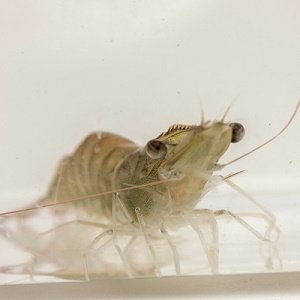
The Pacific white shrimp, Litopenaeus vannamei, is a commercially important aquaculture species. However, challenges such as disease outbreaks and fluctuating salinity levels can significantly impact shrimp production.
Shrimp cultivation at higher salinities requires higher protein levels, increasing feed costs and posing risks to protein metabolism and environmental pollution. Therefore, there is a need to identify new protein sources for the shrimp industry.
Researchers are constantly seeking sustainable solutions to improve shrimp health and resilience. A recent study published by researchers from Guangdong Ocean University, Zhanjiang Experimental Station, CATAS, Key Laboratory of Aquatic, Livestock, and Poultry Feed Science and Technology in South China, and Aquatic Animals Precision Nutrition and High Efficiency Feed Engineering Research Center of Guangdong Province explored the potential of Chlorella vulgaris (CHL), a unicellular green microalga, as a protein source in the diets of L. vannamei raised under various salinity conditions.
The Research
Researchers fed juvenile L. vannamei for eight weeks at different salinity levels: low (15‰), moderate (30‰), and high (45‰).
The control diet contained 589 g/kg of fish meal (FM) as the sole protein source, while experimental diets included 150 g/kg of fish meal (FM) and 492 g/kg of CHL as protein sources.
Improved Survival and Disease Resistance
The study revealed that shrimp fed with CHL exhibited a notable survival rate even under high salinity conditions. They also showed significantly higher survival rates compared to those fed the control diet (with fish meal as the sole protein source) after infection with Vibrio parahaemolyticus. This suggests that CHL can enhance disease resistance and shrimp resilience.
Enhanced Immune Response and Digestion
The study further investigated the impact of CHL on shrimp’s internal processes. Enzymatic activity and gene expression analyses indicated that CHL improved the immune response and digestion in L. vannamei compared to fish meal, even at similar salinity levels. This suggests that CHL provides essential nutrients and bioactive compounds that support key physiological functions in shrimp.
Adaptability to Salinity Changes
Salinity fluctuations can be detrimental to shrimp health and growth. The study found that shrimp fed with CHL outperformed those fed with fish meal under variable salinity stress. This suggests that CHL can enhance shrimp’s ability to adapt to changing salinity levels, making them more resistant to environmental stressors.
Positive Impacts on Microbiota and Gene Expression
Microbiota analysis revealed greater diversity and beneficial bacteria in the intestines of shrimp fed with CHL compared to those fed with fish meal. This suggests that CHL promotes a healthy intestinal environment, which plays a crucial role in shrimp health and disease resistance.
Stay Always Informed
Join our communities to instantly receive the most important news, reports, and analysis from the aquaculture industry.
Transcriptomic sequencing identified genes with differential expression (DEG) related to immune and metabolic pathways in shrimp fed with CHL. A combined analysis of microbiota and DEG revealed that CHL also alters the composition of intestinal microbiota and regulates the expression of genes responsible for immune response and metabolism.
Conclusion
This study provides compelling evidence that Chlorella vulgaris can be a highly beneficial protein source for L. vannamei aquaculture. Supplementation with CHL improved survival rates, disease resistance, immune response, digestion, and adaptability to salinity changes.
“The consumption of CHL in the diet had a notable positive impact on the survival rate, nonspecific immune response, intestinal well-being, and disease resistance capacity in L. vannamei at all salinity levels. However, it had no significant effect on other growth measures,” concluded the researchers.
Furthermore, it had a positive impact on intestinal microbiota and gene expression, suggesting a holistic approach to improving shrimp health and performance.
While this study provides valuable information on the benefits of CHL for shrimp aquaculture, further research is needed to optimize CHL inclusion levels, investigate long-term effects, and explore CHL’s full potential.
As research and development continue, Chlorella vulgaris has the potential to be a sustainable and effective solution for improving shrimp health, promoting disease resistance, and enhancing overall aquaculture productivity.
The study was funded by the National Natural Science Foundation of China, General Program of Natural Science Foundation of Guangdong Province, China, and Modern Seed Industry Park for Whiteleg Shrimp of Guangdong Province.
Contact
Lili Shi
College of Fisheries, Guangdong Ocean University, Zhanjiang, China
Email: shill@gdou.edu.cn
Shuang Zhang
College of Fisheries, Guangdong Ocean University, Zhanjiang, China.
Email: zshuang@gdou.edu.cn
Reference
Jian Chen, Hongming Wang, Hang Yuan, Naijie Hu, Yudong Zheng, Beiping Tan, Lili Shi, Shuang Zhang. Tapping Chlorella vulgaris potential for enhanced growth, immunity, digestion, microbiota, and immunometabolism in Litopenaeus vannamei feeding across varied salinities, Aquaculture, 2023, 740469, ISSN 0044-8486, https://doi.org/10.1016/j.aquaculture.2023.740469.
Editor at the digital magazine AquaHoy. He holds a degree in Aquaculture Biology from the National University of Santa (UNS) and a Master’s degree in Science and Innovation Management from the Polytechnic University of Valencia, with postgraduate diplomas in Business Innovation and Innovation Management. He possesses extensive experience in the aquaculture and fisheries sector, having led the Fisheries Innovation Unit of the National Program for Innovation in Fisheries and Aquaculture (PNIPA). He has served as a senior consultant in technology watch, an innovation project formulator and advisor, and a lecturer at UNS. He is a member of the Peruvian College of Biologists and was recognized by the World Aquaculture Society (WAS) in 2016 for his contribution to aquaculture.







